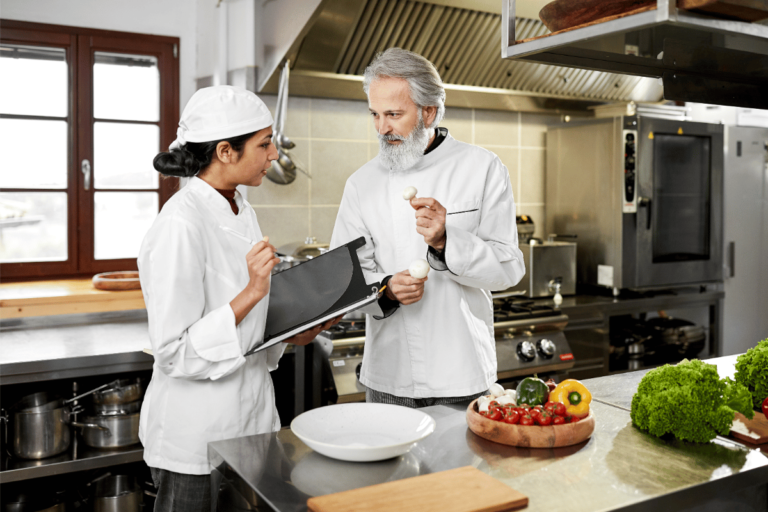Mastering Bar Operations and Management Basics
Think about walking into your favorite bar after a tough day at the office. The cozy vibe, energetic conversations, and the sound of glasses clinking welcome you. As you find a spot at the bar, you can’t help but notice Alex, the bartender, making a cocktail with style. You chat with Alex and learn that a thriving bar is more than just about drinks—you must know the basics of managing a bar too.
Running the bar well and making customers happy is a big deal. This involves training staff, keeping track of drinks, and using smart ways to attract people. Bars that work smoothly need a mix of skills and methods.
This in-depth guide will cover everything you need to know about running a bar, from teaching your staff bartending basics to serving customers well. We’ll give you real-world advice and plans to boost your bar’s profits. Our focus will be on controlling what drinks you have, ways to treat customers well, and ways to make your bar known. All this will help you elevate your bar’s success.
Key Takeaways:
- Mastering bar operations and management basics is essential for running a successful bar.
- Training your bar staff in basic bartending skills is crucial for delivering exceptional customer service.
- Understanding beverage inventory control is essential for maintaining profitability.
- Implementing effective marketing strategies can attract and retain customers.
- Providing excellent customer service is key to creating memorable experiences.
Preparing to Train Your Bar Staff
Organizing your training area is key for getting your bar team ready. It ensures a strong start for their learning.
First, make sure the bar is tidy and all items are easy to reach. This step allows for a smoother service. It means your team can work better and faster.
Next, show your team around your bar. Each place is set up differently. Explain how things work and show them the tools they’ll use. This prep will help them be ready for any task.
“An organized and clean training space sets the stage for effective learning and development.”
Knowing your drinks is fundamental. Make sure your team learns about all the beverages. This info helps when they talk to customers and suggest drinks.
Teaching about glasses and how to make drinks look good is also crucial. Explain the kinds of glasses used and why. Show them how to serve drinks right. This makes the customer’s experience better.
Make sure your team knows the basics of making drinks. Give them recipes for common cocktails. Show them how it’s done and let them practice. This way, they learn about flavors and how to adjust recipes.
Summary:
| Key Points | Benefits |
|---|---|
| Organize the bar area | Create an efficient workflow and enhance productivity |
| Explain unique bar setup | Ensure staff is comfortable and confident in their tasks |
| Focus on product knowledge | Empower staff to make informed recommendations |
| Teach glassware and presentation | Create a visually appealing customer experience |
| Share standard drink recipes | Build a foundation for crafting delicious cocktails |
To get your bar team ready, focus on organization and product knowledge. These steps are key. They help your staff learn what they need to serve well and delight customers.
Teaching Basic Bartending Skills
Being a great bartender means knowing the basics really well. You should be skilled at measuring ingredients just right. Mixing drinks properly is a must. Being quick and efficient is key when things get busy. It’s all about making sure customers get their drinks fast. Keeping a close eye on your bar’s stock and managing it well is also important.
If you’re teaching new bartenders, here’s where to start:
Mixing Techniques
Training bartenders to mix drinks perfectly is crucial. They should know the exact amounts for each recipe. Show them how to shake, stir, and strain drinks correctly. Making drinks the same way every time ensures they taste just right.
Speed and Efficiency
Fast service matters a lot in a bustling bar. Bartenders should know which drinks to make first. This means guests get their orders quickly. Working together as a team is essential. It helps everyone keep up and deliver top-notch service when the bar is busy.
Inventory Management
Keeping track of what your bar has is vital. Make sure your bartenders know how to document low stock. Set up a system for tracking inventory at the start and end of each day. This way, you keep waste to a minimum and the bar always has what it needs.
These skills are key for bartenders to serve guests well and make their visits great. Focus on these areas to help your team excel and keep customers happy.
Training to Deliver Excellent Customer Service
Bar staff need top-notch customer service skills. They must be great at listening and talking to make guests feel welcome. These skills help create a fun and friendly place.
Staff also learn how to deal with tough customers in training. They’re taught to handle those who drink too much or cause problems. This way, bars stay safe and fun for everyone.
Knowing how to serve alcohol responsibly is key too. Employees learn about safe drinking and how to spot when someone’s had too much. It’s also crucial to keep up with laws to stay legal.
Teaching staff to suggest good drinks and food improves the visit for customers. This makes service personal and increases customer happiness. But, it’s always important to keep customer safety first.
Keeping things clean is another vital part of great service. Employees are trained to keep the bar clean and hygienic. This makes a good first impression and keeps the place nice for guests.
Training covers many areas like communication, dealing with tough customers, and hygiene. It helps staff give great service. This ensures everyone has a good time at the bar.
| Key Aspects of Training to Deliver Excellent Customer Service | |
|---|---|
| Interpersonal Skills: | Promote active listening and effective communication |
| Handling Difficult Customers: | Teach techniques to manage disruptive or overconsumed patrons |
| Responsible Alcohol Service: | Emphasize responsible alcohol consumption and staying updated on laws |
| Suggestive Selling: | Train staff on recommending complementary drinks and menu items |
| Cleanliness and Sanitation: | Ensure proper hygiene and cleanliness for a pleasant bar environment |
With good training, bars can improve their service. This creates happy customers and a great atmosphere. It’s all about making the guest experience unforgettable.
Promoting Teamwork and Communication
Good communication and working together are vital in a busy bar. It helps staff stay informed and do their jobs well. Also, teaching how to handle conflicts can make the work environment better. This leads to happier staff and better service for customers.
When people don’t communicate well, mistakes and unhappy customers can happen. To avoid this, it’s important to have a clear way for staff to talk with each other. This builds trust among the team.
Knowing how to solve problems is key, whether it’s between workers or with customers. Training staff in skills like listening and finding solutions together makes hard times easier. This approach can turn a tense moment into a positive interaction.
Creating a happy workplace means doing things together and being kind. Team-building activities and helping each other out on busy days matter a lot. A place where everyone respects and listens to each other is where teamwork thrives.
“Effective communication is vital in high-stress situations. By promoting open and transparent communication channels, resolving conflicts proactively, and fostering a positive work environment, bars can cultivate a strong team that can handle any challenges that come their way.”
Conflict Resolution Techniques
Solving conflicts quickly and well is key. Here are some steps for staff:
- Active Listening: Encourage staff to really hear what others are saying during a conflict.
- Empathy: Teach them to see things from the other person’s point of view.
- Finding Common Ground: Help everyone focus on what they agree on, not just disagree.
- Collaborative Problem-Solving: Encourage everyone to find solutions that work for all.
Training in these techniques helps deal with problems while keeping things positive. This is good for everyone, including the staff and the customers.
Promoting Teamwork in a High-Stress Environment
Working well together in a busy bar needs planning. Here’s how to do it:
- Assigning Roles and Responsibilities: Make sure everyone knows what their job is and how it helps the team.
- Encouraging Support and Assistance: Create a culture of helping each other to make busy times easier.
- Celebrating Successes: Boost morale by acknowledging and cheering on the team’s wins.
- Regular Team Meetings and Check-Ins: Meeting often lets everyone talk about what’s working and what can be better.
In a bar that values teamwork and communication, work is better and people are happier. This is the kind of place where everyone wants to be their best.
Tools for Continuous Improvement
To be competitive and offer great service, bars need to always improve. By using the right tools and methods, bar staff can get better at what they do. This includes learning new skills, following trends, and making customers happy.
Feedback and Evaluation
It’s key to have regular times to talk about what’s going well and what needs work. Giving helpful feedback shows staff where they’re strong and where they can grow. This open approach helps them feel supported and improves their skills. It’s also important for staff to think about how they’re doing and ask others for advice. This kind of self-reflection and input from peers can go a long way.
Ongoing Training and Skill Enhancement
Bars should offer ways for their staff to get better and stay current. This means having regular training on the latest bartending and mixology. It also includes learning about new drink flavors. Tastings can help staff get to know products better. These activities not only boost morale but also help in the team’s continuous improvement.
Staying Updated with Industry Trends
Keeping up with what’s new is extremely important in the bar world. Staff should read industry magazines, follow key social media, and attend events. Doing this helps them learn about the latest drinks and what customers like. This knowledge helps bars stay ahead.
By using these methods for ongoing growth, bar staff can become better at their jobs. They will offer top-notch service and help their bar succeed.
Quote:
“Continuous improvement is not just about adopting new practices; it’s about evolving and staying relevant in an ever-changing industry.” – John Anderson, Bar Manager
Continuous Improvement Checklist:
| Tools for Continuous Improvement | Description |
|---|---|
| Feedback and Evaluation | Regular feedback and evaluation sessions help staff identify strengths and areas for improvement. |
| Ongoing Training and Skill Enhancement | Offer opportunities for staff to enhance their skills and knowledge through regular training sessions and tastings. |
| Staying Updated with Industry Trends | Encourage staff to stay informed about industry trends through subscriptions, social media, and industry events. |
Understanding Legal and Regulatory Compliance
Operating a bar means following laws and rules closely. This keeps the place safe and its reputation strong. Bar staff need to know alcohol laws well to do their jobs right.
Teach your staff about serving alcohol responsibly. It’s important they keep current on the laws in your area. This helps them avoid legal trouble and make smart choices.
Checking IDs and verifying ages is very important. Your team must check IDs carefully to keep the bar safe and legal. Make sure they know how to properly check IDs and what IDs are valid.
Doing this well stops minors from drinking and lowers your legal risks.
By making sure your bar follows all laws, you show you are serious about being responsible. This not only protects your guests but also makes them trust your bar more.
| Key Points to Train Staff on Legal and Regulatory Compliance: |
|---|
| 1. Emphasize responsible alcohol service |
| 2. Stay up-to-date with alcohol laws and regulations in your state |
| 3. Train staff on age verification and ID checks |
| 4. Teach employees to recognize acceptable forms of identification |
| 5. Outline proper procedures for checking IDs |
Organization
Being organized is vital for bar managers. It allows them to convey tasks clearly and keeps things running smoothly. Since they often handle multiple things at once, multitasking is key in their job.
| Key Aspects of Organization | Benefits |
|---|---|
| Efficient Task Communication | Ensures clear instructions and minimizes confusion among staff, leading to improved productivity. |
| Smooth Workflow | By organizing operations and maintaining proper systems, managers can create a seamless flow of tasks, reducing downtime and enhancing customer service. |
| Effective Resource Management | Organized managers can allocate resources efficiently, keeping track of inventory, reducing waste, and maximizing profitability. |
| Timely Problem Solving | With an organized approach, managers can quickly identify and address issues, ensuring minimal disruptions to service. |
Time management is just as important as task management for bar managers. They need to decide what’s most important, plan tasks, and share the work when it’s too much. This keeps their bar running smoothly.
Managing a Bar with Efficiency and Precision
“Organization is the key to success in bar management. By mastering the art of organizing tasks, resources, and time, bar managers can create a harmonious environment where operations run seamlessly and customers are satisfied.”
Great Communication
For bar managers to do well, they need to talk effectively. They should be good at chatting with everyone, like staff, customers, and more. Great chat skills help things run smoothly at the bar and make guests happy.
Bar managers should also pay attention to what’s not being said. Things like body language and faces can tell a lot. This helps them understand what guests want without asking directly. Then, they can give better service and make people feel special.
Managers must keep conversations clear with their team. It’s important for bar staff to share their thoughts and feelings openly. This makes teamwork better and solves issues faster.
“Good communication is the bridge between confusion and clarity.”
Benefits of Great Communication for Bar Managers:
- Efficient information exchange
- Improved staff morale and job satisfaction
- Enhanced teamwork and collaboration
- Better understanding of customer needs
- Effective conflict resolution
Bar managers who focus on talking well can make the bar a happy place. They know how to read what guests aren’t saying and keep their team talking. With these skills, they can do better at their jobs and help the business succeed.
| Benefits of Great Communication | Description |
|---|---|
| Efficient information exchange | Clear and quick talk spreads information right, stopping mistakes and misunderstandings. |
| Improved staff morale and job satisfaction | Talking openly and well makes work better. It makes people like their jobs more and want to do well. |
| Enhanced teamwork and collaboration | When everyone talks well, they work better together. This helps them all meet their goals. |
| Better understanding of customer needs | Listening and watching how people act can tell bar managers a lot. They can then meet customer wants better. |
| Effective conflict resolution | When people share their thoughts freely, it’s easier to solve problems. This keeps the place friendly and customers happy. |
Passion and Dedication

Successful bar managers show passion and dedication. They must really enjoy what they do. This means they are always ready to work hard for their bar’s success.
When a bar manager loves their job, they bring excitement to the team. This passion can spark new ideas and energy. It helps everyone at the bar work better together and achieve more.
These managers are devoted to giving the best service and making guests’ experiences unforgettable. They are proud of their work and always try to do better, whether it’s making drinks or talking with customers.
They also focus on their team, spending time to train and grow their staff. They want their employees to have the skills to provide top-notch service. This commitment to the team helps the bar run smoothly and keeps customers happy.
Dedicated bar managers keep learning and growing. They learn about new trends and methods by going to events and conferences. This way, they can always offer the latest and best to their guests.
Passion and dedication spread like a good song. They inspire the whole team to do their best. This teamwork creates wonderful memories for customers, encouraging them to return again and again.
| Key Qualities of a Passionate and Dedicated Bar Manager |
|---|
| 1. Enthusiasm and energy |
| 2. Commitment to exceptional service |
| 3. Desire for continuous improvement |
| 4. Strong leadership skills |
| 5. Knowledge of industry trends |
| 6. Dedication to staff development |
Stress Resistance
Being a bar manager is tough and requires people to handle stress well. This skill is vital for managing both the bar and unforeseen challenges. It is important for learning from past issues to prevent them in the future.
When the bar is busy, managers face many stressful moments. These can include customer issues, low stock, or disagreements between staff. Being cool under pressure helps managers think clearly and make smart choices.
Sarah Thompson, a seasoned bar manager, says stress is just part of the job. She adds that staying calm not only keeps her professional but also lets her solve problems effectively, ensuring great service.
To improve their stress resistance, bar managers can use a few steps. They can get better at time management to cut down on stress. Also, taking care of themselves by exercising, sleeping enough, and eating right helps a lot.
Stress Resistance Tips for Bar Managers:
- Take breaks: Plan for short pauses to refresh and stay sharp.
- Practice deep breathing: Deep breaths can release tension and bring calm.
- Seek support: Chat with coworkers or experienced people about stress management.
- Stay organized: A neat workspace and lists can lower stress by making all tasks clear.
- Adopt a positive mindset: A good attitude can lessens stress and boost problem-solving skills.
By working on stress resistance, bar managers can face their job’s challenges better. Their ability to handle stress well helps keep a good atmosphere in the bar. This, in turn, supports the bar’s smooth running and success.
Conclusion
Learning to serve drinks well is key for bar staff and managers alike. It helps make the dining experience top-notch. Knowing about different beverages helps staff recommend great choices to customers. Plus, they can serve drinks in a way that looks elegant, making customers happy.
It’s important for bar staff and managers to keep learning about beverages. The industry changes fast, so staying updated is a must. Learning new trends and improving skills helps bar workers stand out. This way, they can offer excellent service and meet customers’ changing tastes.
Bar managers are vital for teaching their teams about serving drinks. They help staff learn and grow by offering training and creating a learning environment. Good managers show a real love for the job and have strong communication. They also know how to handle pressure. Leading their teams by setting a good example, they ensure customers have a great time at the bar.
Bar staff can take their service to the next level by using their beverage knowledge and learning continuously. This means they can suggest the best drinks and offer unique experiences, like whiskey tastings. By always trying to get better, bar workers can succeed in their careers and make their customers’ visits truly memorable.
FAQ
Q: What are the basics of bar operations and management?
A: Bar management includes teaching staff, keeping track of items, and making sure customers are happy. It’s also about making the bar area inviting, promoting a friendly atmosphere, and following the law. This way, bars can do well and customers enjoy their visit.
Q: How can I best prepare to train my bar staff?
A: Start by setting up the bar properly and making sure your staff knows where everything is. Training involves teaching them how to clean and use tools right, as well as about different drinks. Make sure they know how to make common drinks and show them how.
Q: What basic bartending skills should I teach my bar staff?
A: Focusing on making drinks correctly is key. Teach them to mix drinks, measure accurately, and serve quickly. They also need to learn to handle many drinks at once and keep track of what’s in stock.
Q: How can I train my bar staff to deliver excellent customer service?
A: Good customer service starts with being a good listener and talker. Train them to interact positively with customers and handle difficult situations well. It’s also important to make sure they focus on safety by checking IDs and keep the bar clean.
Q: What can I do to promote teamwork and communication among my bar staff?
A: Encourage your team to talk and listen to each other. This helps avoid misunderstandings. Teach them to solve problems together and make the work environment pleasant. This way, everyone works well together.
Q: What tools can I use for continuous improvement in my bar operations?
A: Give feedback to help your staff improve. Have regular training to build their skills. It’s also good for them to know what’s new in the bar world. They can do this by reading magazines and keeping up with trends online.
Q: How important is legal and regulatory compliance in the bar industry?
A: It’s very important to follow the law in bars. Make sure your staff knows how to serve alcohol safely and checks IDs. This protects customers and keeps your bar in good standing.
Q: What skills are essential for a bar manager?
A: Managers need to be good at organizing and handling many things at once. They must know how to talk to customers and their team. Being passionate, committed, and able to handle stress is key for their success.
Q: How can mastering beverage service enhance the bar experience for customers?
A: Knowing drinks well helps staff guide customers to find what they’ll like. Good service and an inviting atmosphere make people want to come back. Staff who keep learning about drinks are more ready to meet customer needs.







